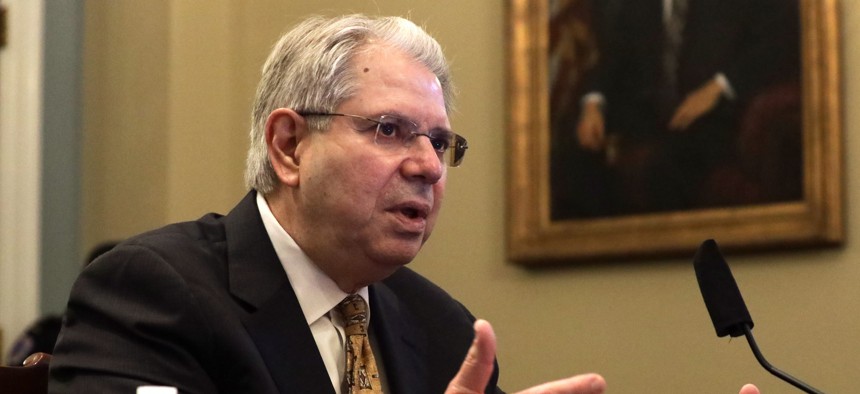
U.S. Comptroller General Gene Dodaro said in GAO's report to Congress that reducing fragmentation and duplication could save billions. Alex Wong / Getty Images
New Report Identifies Over $100B in Potential Government Services Savings
The government’s overlapping, fragmented and duplicative services are costing billions of dollars annually, a Government Accountability Office report claims.
The federal government can save more than $100 billion over the next 10 years by fixing recent overlaps, duplication and other critical issues impacting government services, according to a new Government Accountability Office report.
The GAO's 13th annual cost-savings report identified 100 new corrective measures that agencies can implement to reduce fragmented and overlapping goals while improving the efficiency and effectiveness of government services.
Recommendations include addressing costly issues resulting from initiatives launched during the COVID-19 pandemic. For example, the report says that the Internal Revenue Service can implement additional compliance activities to potentially recapture "tens of millions of dollars or more of ineligible claims," while the Small Business Administration can recover millions by identifying potentially fraudulent Restaurant Revitalization Fund recipients.
Gene Dodaro, U.S. Comptroller General and head of the GAO, said this year's targeted list of recommendations could help save the government "tens of billions of dollars, significantly enhance revenues and make government programs work better for the American people.”
New monitoring mechanisms to identify and remove ineligible family members from federal health benefits programs could help the Office of Personnel Management save hundreds of millions of dollars annually.
GAO also called on Congress to direct the Department of Health and Human Services to equalize payment rates for patient evaluations and other services paid by Medicare, effectively ensuring the federal health insurance program pays the same amount of money at different places where people receive healthcare services.
The move could provide an estimated $141 billion over 10 years in potential benefits, according to the Congressional Budget Office, while ensuring fairness in payments for healthcare services nationwide.
The report also called on Congress to reauthorize the First Responder Network Authority by 2027 to maintain its collection of potential revenues that could amount to billions of dollars over 15 years and ensure the continuity of the public-safety broadband network.
Previous GAO efforts to fix fragmented, overlapping and duplicative federal missions have yielded nearly $600 billion in financial benefits, including $46.8 billion in the last year, according to the report.
GAO said that agencies have fully addressed the majority — nearly 66% — of recommendations identified between 2011 to 2023, and added that addressing the 527 matters and recommendations that remain open "could result in savings of tens of billions of dollars and improved government services, among other benefits."







